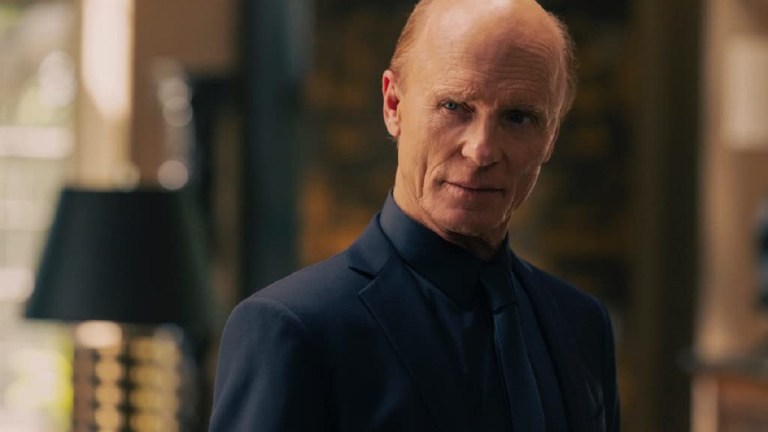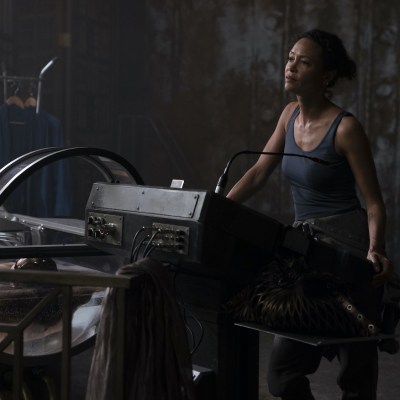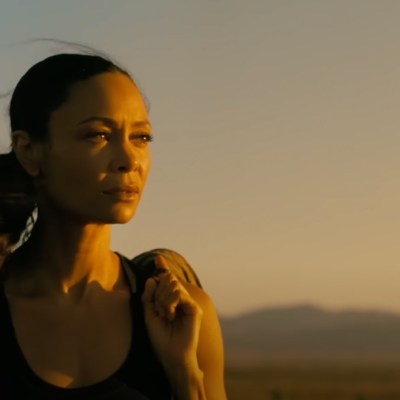Westworld Season 4 Episode 1 Review: The Auguries
Westworld picks up where it left off. The Man In Black is back, and he's up to his old tricks. Rehoboam is gone, but some things never change.

This Westworld review contains spoilers.
Westworld Season 4 Episode 1
At the end of season 3 of Westworld, things looked fairly bleak for humanity. After all, there were still fires burning and riots in the streets, hundreds of people were either killed or killed themselves, and humanity’s social order had been thrown into chaos by the revelation that Incite’s AI program Rehoboam controlled everything about every person’s fate. That seems like the kind of thing that would indeed kick off a melt-down of society and full-scale revolution, right? As it turns out, that’s not exactly the case.
Take the case of Caleb (Aaron Paul), who was one of the people who broke the chains on humanity. When we met him, he was working construction with a robot pal and wishing for a better life. Eight years after literally bringing down the world’s richest man, he’s still working construction, just without any robot helper to do the really hard, dangerous work. Sure, he’s got all the overtime he wants, human co-workers, and a wife and child, but his life isn’t any different. As his coworker says, maybe that Incite machine didn’t tell us who we were going to be, it just told us who we are.
But who are we, really? Are we what our behavior patterns can be distilled to? Are we merely hosts laboring under the delusion of free will and self-determination, trapped in loops of our own?
Christina (Evan Rachel Wood) seems trapped. She gets up, zips up her bed, raises the blinds on her New York City apartment, then walks the High Line on her way to work, where she pitches plots for games at Olympiad Entertainment. She’s not great at her job; nobody wants romance and happy endings, people want melodrama, transgressions, and lots of downer endings. Not a natural choice for someone who seems to see the beauty in the world around her. She leaves work, goes back home, and repeats the whole process again the next day, with only sporadic interruptions by a deranged man calling her phone hundreds of times a day, begging her to change her stories, begging that his life has been destroyed by her game. Engaging him only escalates the behavior; it’s all a big mystery waiting to be unraveled.
While Caleb tries to forget his past and Christina tries to forge a future, Maeve (Thandiwe Newton) is hiding from the ambitious, dangerous man in charge of Delos, William (Ed Harris), who has emerged from hiding and resumed his mad quest to hunt down and exterminate the escaped Hosts, starting with Maeve, and supporters of hosts like Caleb. He also kills off a Mexican cartel and takes over a data storage facility built into the Hoover Dam in the cold opening, so William might have been laying low, but he’s still thinking big and solving his problems with violence. His emergence spells trouble for both Maeve and Caleb. As it turns out, paranoia can be pretty useful when you’re enemies with a vengeful billionaire with a taste for ten-gallon hats, revolvers, and killer robots like the repurposed Col. Brigham (Frederic Lehne) and Hector (Rodrigo Santoro).
Won’t Maeve be thrilled if she sees him again after so long?
It seems as though time jumps are the biggest new trend on television, or at least the genre television I tend to watch. It makes sense, though; if you don’t want to wade through the fallout of an epic season finale, just move forward until it’s settled down and you can work on telling whatever story you’re really looking to tell. In this case, Maeve, William, and Caleb seem to be getting ready to finish what started last season and Christina (or perhaps Dolores?) may be on the cusp of finding a familiar partner to ride shotgun with her on the journey of life. I’m not sure what’s getting set up, but Lisa Joy and Will Soodik’s script is solid work, with Christina being an interesting wrinkle on the traditional role of Dolores as a farmer’s daughter artist who dreams bright and big, and Caleb settling back into familiar roles as a co-conspirator battling against the wealth and power of a billionaire. Maeve’s tongue is sharper than ever after 8 long years of living in the wilderness. The seeds planted for Christina also seem like they’ll be interested, especially considering just who stepped in to prevent her from being battered by her stalker.
Eight years gave humanity an opportnity to rebuild that apparently wasn’t taken, aside from a more open job market. Roles were inevitably settled back into, and the performers on Westworld have no issues settling back into their roles. Aaron Paul’s Caleb is happier, more settled, despite his lot in life not really changing all that much. Christina is a new character, but Evan Rachel Wood imbues her with the weight of Dolores’ old soul with ease. Thandiwe Newton still steals every scene she’s in with a cutting glance; wry amusement drips off every word she utters in her scene with Caleb. Ed Harris may or may not be playing a host version of William, but he’s still the no-nonsense, intimidating threat he’s always been, whether he’s staring at Caleb across a crowded plaza or shaking down a Mexican organized crime syndicate.
Director Richard J. Lewis does a very good job handling the table-setting sections of the story. We don’t really know who Christina is, or why she looks like Dolores, but the scenes of her traveling through New New York are tense, especially once her stalker is actively after her, drawing mazes in dirt on her fire escape and watching her from afar. Caleb’s scenes are more grounded, but the character still seethes with internal struggle that reflects wonderfully in Aaron Paul’s body language; he’s trying to be normal, but he’s not sure what that is after dedicating so much of his life to war. William is William; Ed Harris is the most dangerous pensioner to ever shrug on a suit jacket, and he knows it.
Be it New York, Los Angeles, or the Hoover Dam, Westworld blends the futuristic with the eternal quite beautifully, and Lewis and cinematographer John Conroy do stellar work with the art department to blend the old and new, practical and digital seamlessly. The world changes, but the fundamental things don’t change all that much; glass and steel skyscrapers of Manhattan reach towards the heavens, and the dusty hills of the west persist. There might be different names on the buildings, or new buildings where old once stood, but changing your shoes doesn’t mean you’re replacing your legs. Casting off an AI’s decision on human worth doesn’t make those humans behave in any meaningful way, or change what the computer saw as a person’s personality.
Maeve is going to fight to save herself. Caleb is going to fight because it’s what he knows. The Man In Black will obsess. A Dolores by any other name will still seek out beauty and a happy ending. And Westworld will continue to ask big questions and demand big answers, both from its characters and from its audience.


